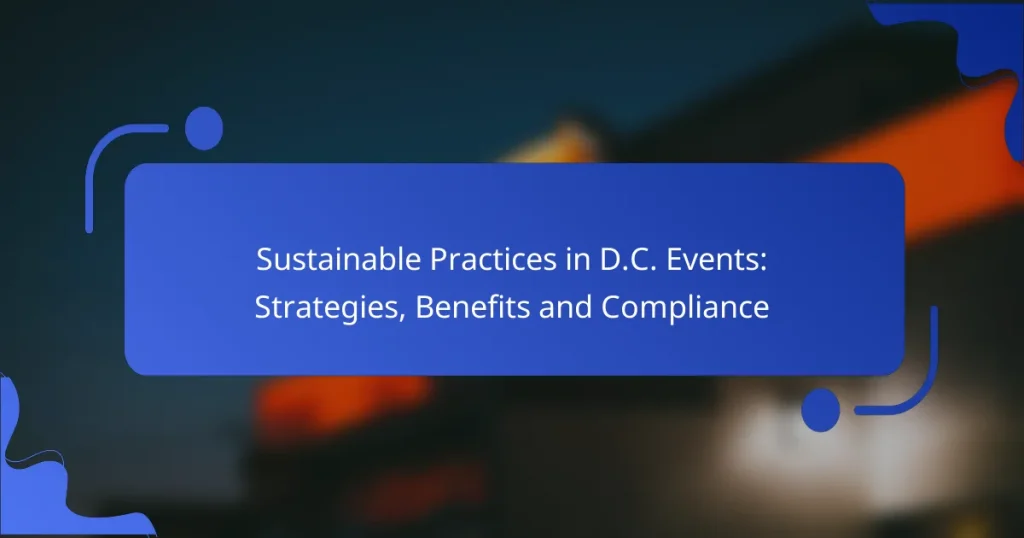Sustainable practices in D.C. events are essential for minimizing environmental impact while enhancing attendee experiences. By adopting eco-friendly strategies, event organizers can achieve cost savings, bolster community relations, and ensure compliance with local regulations, ultimately attracting a more eco-conscious audience.
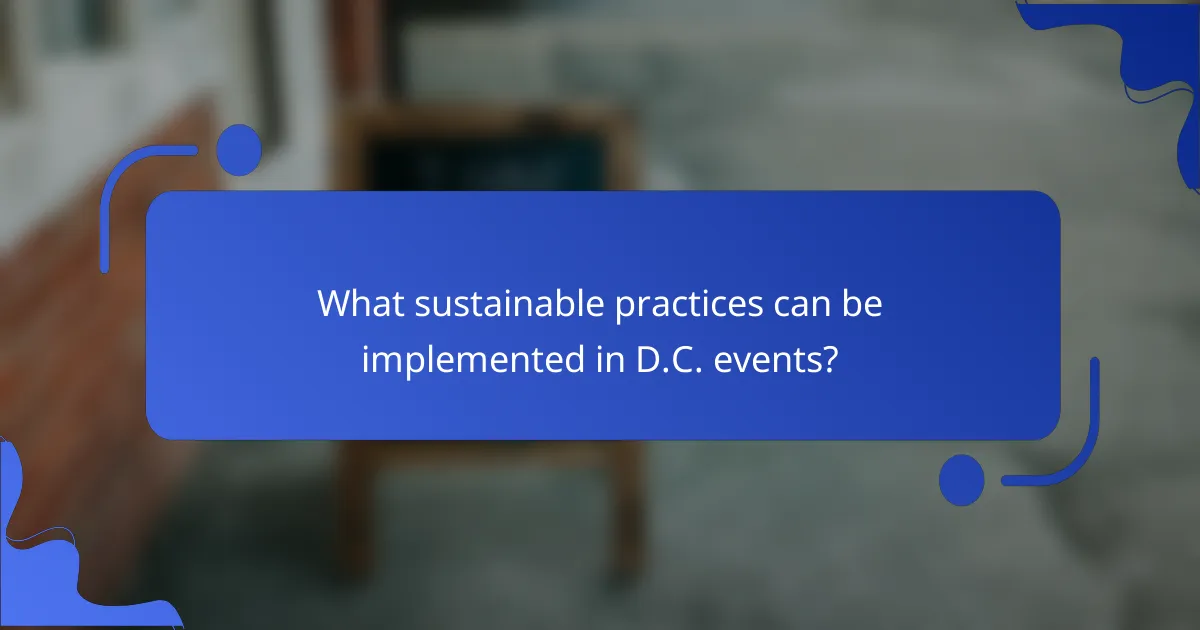
What sustainable practices can be implemented in D.C. events?
Sustainable practices in D.C. events focus on minimizing environmental impact while enhancing the experience for attendees. Implementing these strategies can lead to cost savings, improved community relations, and compliance with local regulations.
Waste reduction strategies
Effective waste reduction strategies include implementing recycling and composting programs at events. By providing clearly labeled bins for recyclables, compostables, and landfill waste, organizers can significantly decrease the amount of waste sent to landfills.
Additionally, reducing single-use plastics by offering reusable alternatives, such as water bottles and utensils, can further minimize waste. Event planners should also consider digital tickets and programs to cut down on paper usage.
Energy-efficient technologies
Utilizing energy-efficient technologies is crucial for reducing the carbon footprint of D.C. events. This can include using LED lighting, energy-efficient sound systems, and smart thermostats to optimize energy consumption.
Event organizers should also explore renewable energy options, such as solar-powered generators, to power their events. These technologies not only lower energy costs but also demonstrate a commitment to sustainability.
Local sourcing of materials
Local sourcing of materials helps support the community and reduces transportation emissions. Event planners should prioritize working with local vendors for catering, decorations, and supplies, which can enhance the event’s authenticity and appeal.
Choosing locally produced food not only supports local farmers but can also provide fresher options for attendees. Establishing partnerships with nearby businesses can foster a sense of community and collaboration.
Carbon offset programs
Carbon offset programs allow event organizers to compensate for their carbon emissions by investing in environmental projects. This can include reforestation efforts or renewable energy initiatives that help balance out the carbon footprint of the event.
Event planners should calculate their estimated emissions and choose reputable offset programs that align with their sustainability goals. This not only mitigates environmental impact but also enhances the event’s reputation among eco-conscious attendees.
Water conservation techniques
Implementing water conservation techniques is essential for minimizing water usage during events. This can include using water-efficient fixtures, such as low-flow faucets and toilets, to reduce overall consumption.
Additionally, providing water refill stations instead of bottled water can encourage attendees to stay hydrated while reducing plastic waste. Educating participants about water conservation practices can further enhance the event’s sustainability efforts.
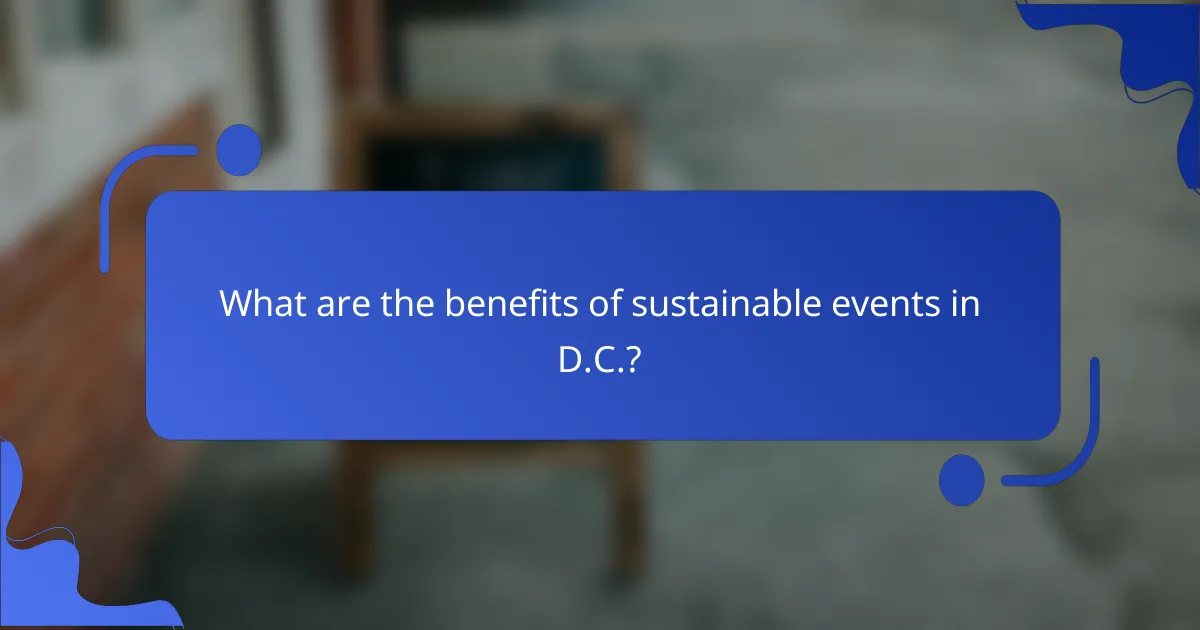
What are the benefits of sustainable events in D.C.?
Sustainable events in D.C. offer numerous advantages, including cost savings, improved brand reputation, and the ability to attract eco-conscious attendees. By implementing environmentally friendly practices, organizers can enhance their event’s appeal while ensuring compliance with local regulations.
Cost savings through efficiency
Implementing sustainable practices can lead to significant cost savings for event organizers. By optimizing resource use, such as energy and materials, expenses can be reduced. For instance, using digital tickets instead of paper can save on printing costs, while energy-efficient lighting can lower electricity bills.
Additionally, waste reduction strategies, like composting and recycling, can minimize disposal fees. Many venues in D.C. offer incentives for sustainable practices, further enhancing financial benefits.
Enhanced brand reputation
Hosting a sustainable event can significantly boost an organization’s brand reputation. Attendees increasingly prefer brands that demonstrate social responsibility and environmental stewardship. By showcasing commitment to sustainability, organizations can differentiate themselves in a competitive market.
Promoting green initiatives during the event, such as using local vendors or sustainable materials, can enhance public perception and foster loyalty among attendees. Positive media coverage can further amplify this reputation, attracting future business opportunities.
Attracting eco-conscious attendees
Sustainable events are more likely to attract eco-conscious attendees who prioritize environmental issues. This demographic is often willing to pay a premium for experiences that align with their values. By marketing the sustainability aspects of an event, organizers can draw in participants who are passionate about eco-friendly practices.
Engaging with local environmental groups and promoting partnerships can also help reach this audience. Offering incentives, like discounts for carpooling or using public transport, can further encourage attendance from eco-minded individuals.
Compliance with local regulations
In D.C., there are various regulations aimed at promoting sustainability in events. Compliance with these local laws not only avoids potential fines but also demonstrates a commitment to community standards. For example, the D.C. Sustainable Energy Utility provides resources and incentives for energy-efficient practices.
Understanding and adhering to waste management regulations, such as the D.C. Universal Recycling Law, is crucial for event organizers. Engaging with local authorities early in the planning process can ensure that all necessary permits and compliance measures are in place, facilitating a smoother event execution.
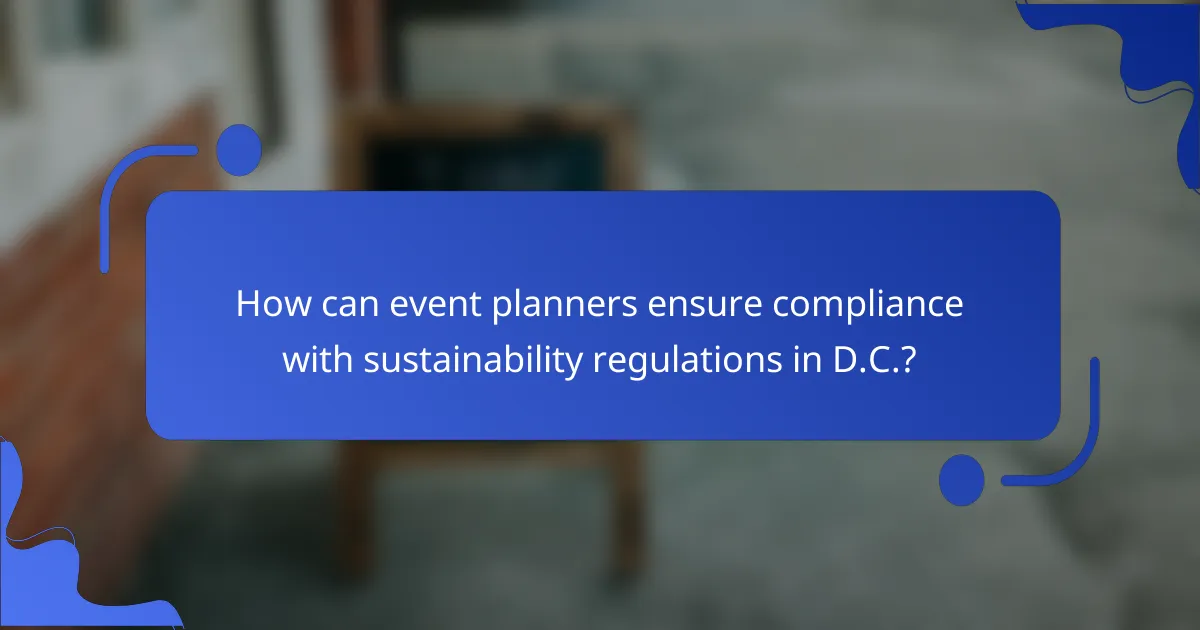
How can event planners ensure compliance with sustainability regulations in D.C.?
Event planners in D.C. can ensure compliance with sustainability regulations by understanding local environmental laws, obtaining the necessary permits, and engaging with local sustainability organizations. These steps help align events with city standards and promote eco-friendly practices.
Understanding D.C. environmental laws
Familiarizing yourself with D.C. environmental laws is crucial for event planners. Key regulations include the Sustainable DC Plan and the Clean Energy Act, which aim to reduce waste and promote energy efficiency. Planners should review these laws to understand their obligations regarding waste management, energy use, and emissions.
Additionally, consider the D.C. Department of Energy and Environment (DOEE) guidelines, which provide specific requirements for events, such as recycling and composting mandates. Staying informed about these regulations can prevent potential fines and enhance the event’s sustainability profile.
Obtaining necessary permits
Securing the appropriate permits is essential for hosting sustainable events in D.C. Depending on the event’s size and location, planners may need permits for street closures, public space usage, or amplified sound. The D.C. government website provides a comprehensive list of required permits based on event type.
It’s advisable to start the permitting process early, as approvals can take several weeks. Be sure to include sustainability plans in your applications, demonstrating how your event will minimize environmental impact.
Engaging with local sustainability organizations
Collaborating with local sustainability organizations can enhance your event’s eco-friendliness and compliance with regulations. Groups like the D.C. Sustainable Business Network and the Green Business Certification program offer resources, guidance, and networking opportunities for event planners.
These organizations can assist in identifying sustainable vendors, promoting waste reduction strategies, and providing educational materials for attendees. Engaging with them not only supports local initiatives but also strengthens your event’s commitment to sustainability.
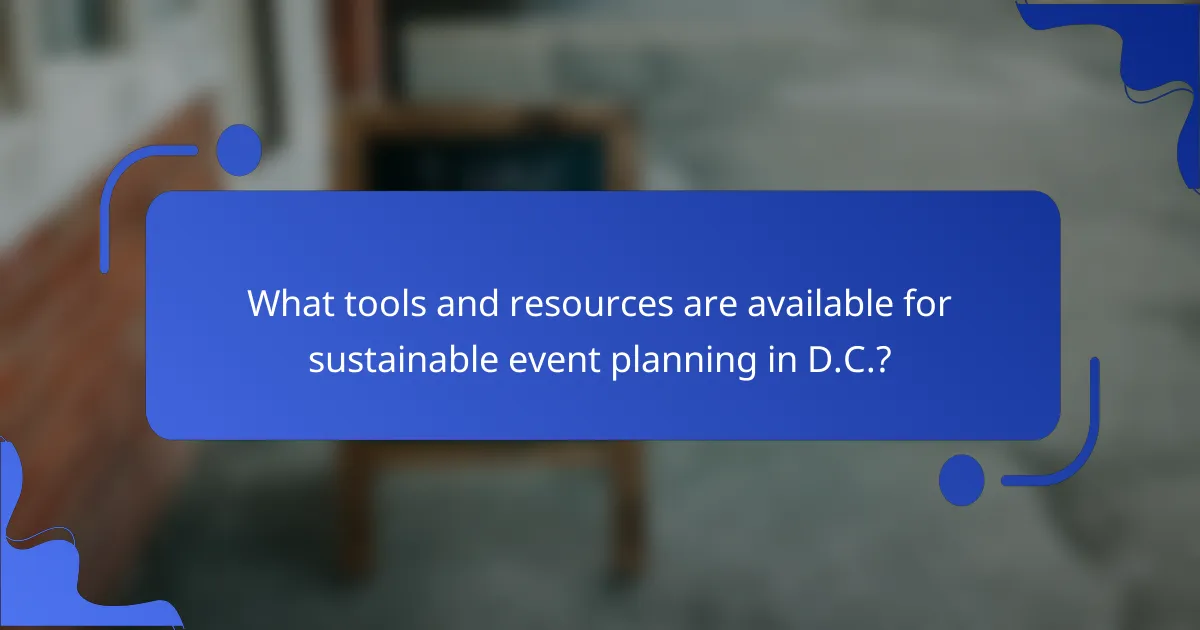
What tools and resources are available for sustainable event planning in D.C.?
In Washington D.C., various tools and resources can facilitate sustainable event planning, ensuring that events minimize their environmental impact. These resources include certification programs, online planning tools, and local vendor directories that support eco-friendly practices.
Event sustainability certification programs
Certification programs for event sustainability in D.C. help organizers demonstrate their commitment to eco-friendly practices. Programs like the Green Meeting Industry Council (GMIC) and the Sustainable Events Network provide guidelines and recognition for events that meet specific sustainability criteria.
Participating in these programs often involves assessing your event’s carbon footprint, waste management practices, and energy usage. Achieving certification can enhance your event’s reputation and attract environmentally conscious attendees.
Online planning tools and checklists
Numerous online tools and checklists are available to streamline sustainable event planning. Websites like Eventbrite and Social Tables offer resources that help organizers incorporate sustainability into their planning processes.
These tools often include customizable checklists that cover aspects such as waste reduction, sourcing local food, and selecting sustainable venues. Utilizing these resources can simplify the planning process and ensure that sustainability remains a priority throughout.
Local vendor directories
Local vendor directories in D.C. can connect event planners with suppliers who prioritize sustainability. Resources such as the D.C. Sustainable Business Directory and local farmers’ markets provide listings of vendors offering eco-friendly products and services.
When selecting vendors, consider their sustainability practices, such as using biodegradable materials or sourcing locally. Collaborating with these vendors can significantly enhance the overall sustainability of your event while supporting the local economy.
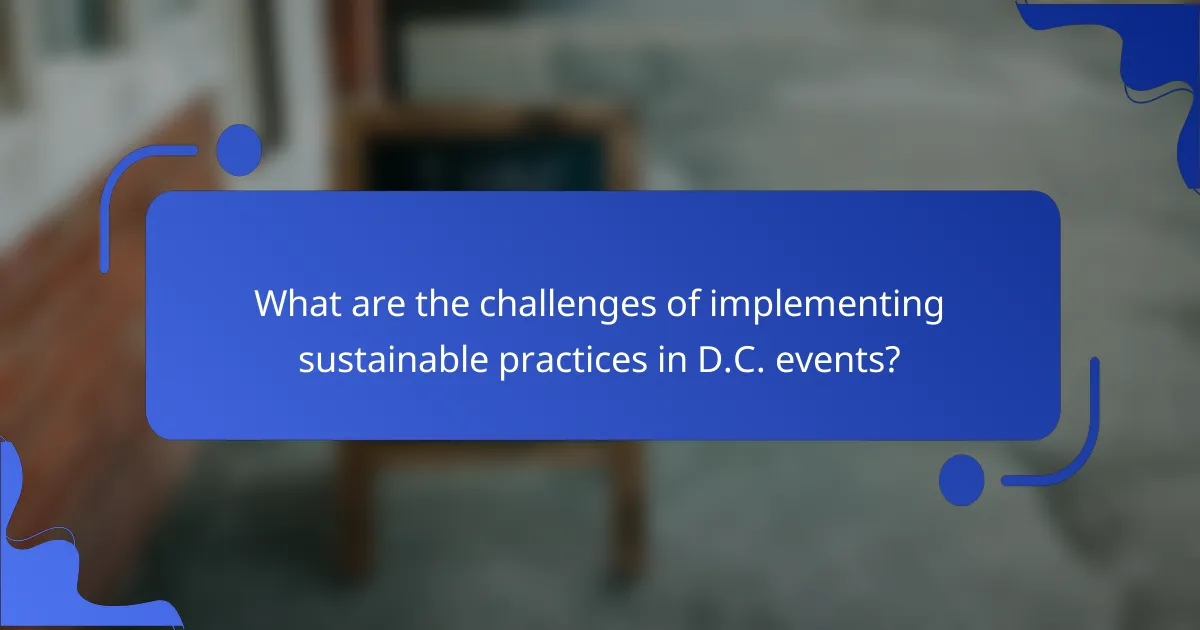
What are the challenges of implementing sustainable practices in D.C. events?
Implementing sustainable practices in D.C. events presents several challenges, primarily related to costs and vendor availability. Event organizers must navigate these hurdles to successfully integrate eco-friendly strategies into their planning.
Higher upfront costs
One of the main challenges of adopting sustainable practices is the higher upfront costs associated with eco-friendly materials and services. For instance, biodegradable products and renewable energy sources often come at a premium compared to traditional options.
Event planners should budget for these initial expenses, as they can range from 10% to 30% more than conventional choices. However, these costs can be offset over time through savings on waste disposal and energy consumption.
Limited availability of sustainable vendors
Finding vendors that offer sustainable products and services can be difficult in D.C. The market for eco-friendly options is still growing, and not all suppliers may meet the necessary sustainability standards.
Event organizers should conduct thorough research to identify local vendors that specialize in green practices. Building relationships with these vendors can lead to better pricing and more reliable service, ultimately enhancing the sustainability of the event.
